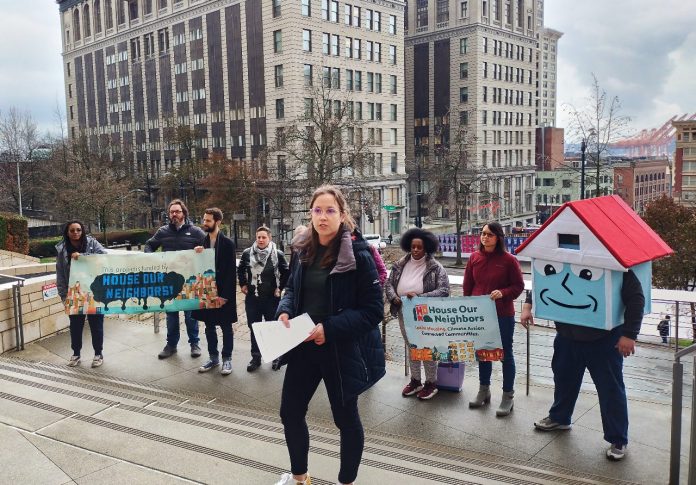
Social housing advocates are riding high in the wake of their 26-point victory to secure a dedicated funding source in a February special election. House Our Neighbors ran the campaign that put Seattle Proposition 1A over the top and gathered supporters in Columbia City this week to celebrate their win and begin organizing for what comes next.
House Our Neighbors’ co-executive director Tiffani McCoy fired up attendees in a speech that also held up the moments of catharsis that the campaign encapsulated.
“There’s tremendous energy. There is a desire for an outlet to put that energy,” McCoy told the gathered supporters Tuesday. “We know that the federal situation is a nightmare, and we want to be able to plug in at the local level, to feel like we still have some control over our lives and over our future, because we do, and we just showed that here in Seattle.”
The win means that the Seattle Social Housing Developer will have approximately $53 million in annual funding via an excess compensation tax hitting companies that pay individual employees more than $1 million in annual compensation. The funding measure builds on the authorizing measure (Initiative 135) that set up the public development authority (PDA), after winning a February special election in 2023. At the time, House Our Neighbors said they planned a future push to add a dedicated funding source to support the PDA, but couldn’t add one with I-135 due to the state requirement that ballot measures contain a single subject, and February’s vote fulfilled that promise.
The scale of Prop 1A’s election victory was so shocking to staunch supporters that McCoy said she didn’t initially believe the election night results, which showed the measure was up 15 points. That lead grew as results came in over the following week.
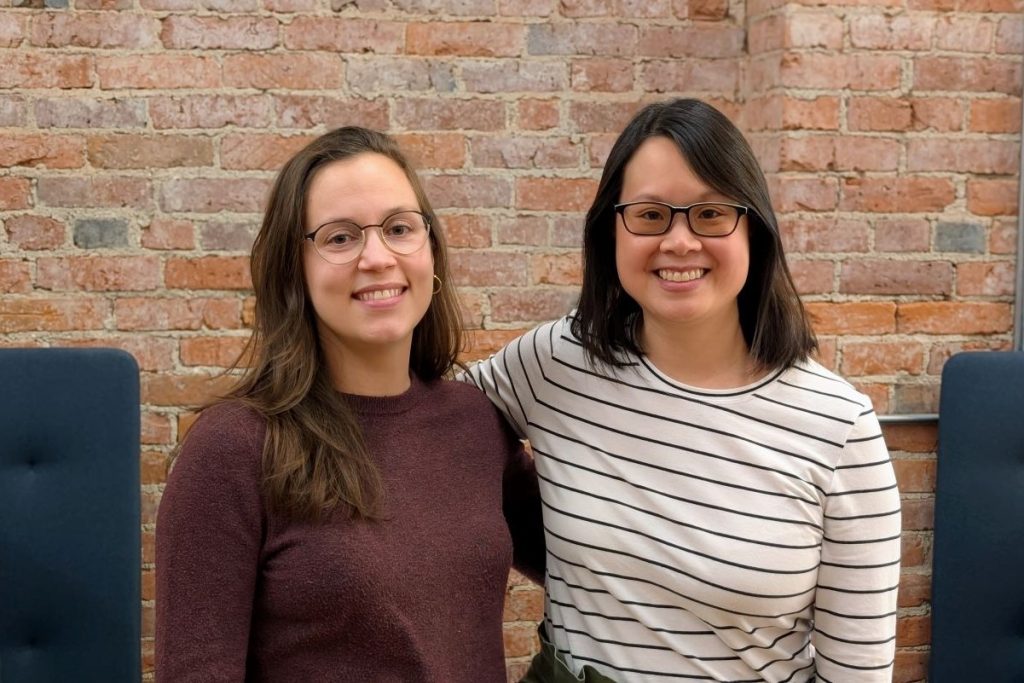
The opposition stacked up against the measure was significant, and driving turnout to winter elections is challenging, which is why most prognosticators expected a tight race.
While House Our Neighbors turned in the ballot signatures last summer to qualify for the November election, the Seattle City Council opted to delay and put the measure on the February special election ballot. Plus, they chose to add a further hurdle by placing their own competing alternative measure alongside Proposition 1A on the ballot. Proposition 1B would have not created a long-term dedicated funding source or even funded mixed-income social housing with the temporary (JumpStart pilfered) funds offered, but it did have the backing of the Seattle Metropolitan Chamber of Commerce, which drafted the measure and lobbied hard for its inclusion.
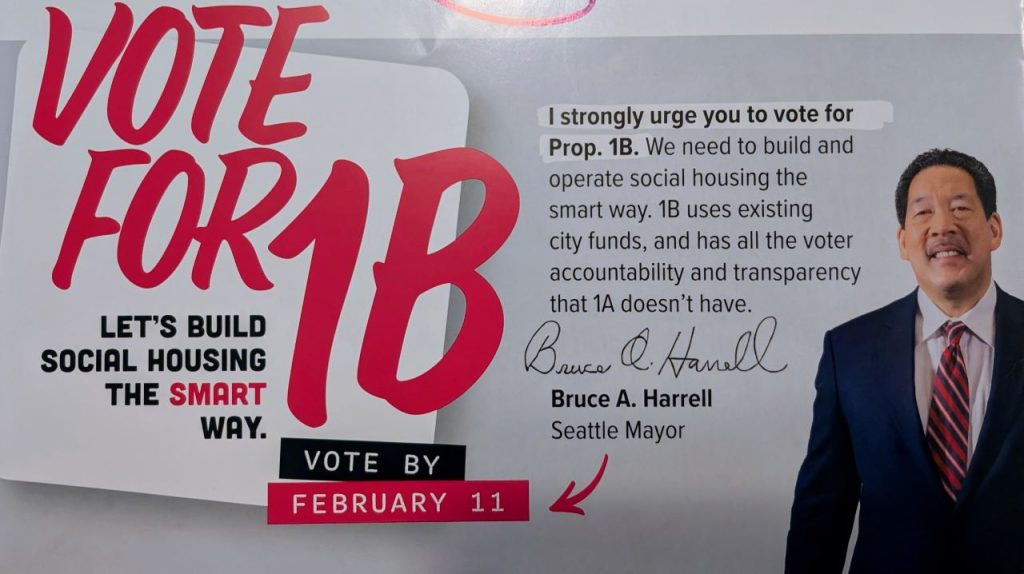
The chamber and the region’s wealthiest companies led by Amazon and Microsoft also spent heavily to campaign against social housing, and convinced Mayor Bruce Harrell to endorse their alternative and appear on their campaign mailers. Likewise, the Seattle Times Editorial Board endorsed the chamber-backed alternative and aggressively attacked Prop 1A as posing “grave concerns” and the Seattle Social Housing Developer as having “failed basic competency, transparency and accountability standards.”
“The opposition spent six or $700,000 in 21 days, and that just seemed like a huge challenge,” McCoy said.
Social housing mobilizes grassroots energy
Social housing advocates were worried the flood of cash would swamp the low-turnout February election. However, they went all in on grassroots organizing to counteract the monetary might of big business.
“All this immense groundwork that we needed to do, and we needed to do it starting in November, in the winter, when the sun goes down at five o’clock,” field organizer Ben Ferlo said. “It is cold, it is raining. There are atmospheric rivers during this time. There are several major holidays just within, like a four week period of time, and we got to convince people to come out to a February special election that routinely, time and time again, when we were knocking doors, people would say, ‘February election? I didn’t know there was a February election going on.’ All of this stacked up against us, with the Chamber of Commerce opposition that we knew was coming in.”
As it turned out, the swell of support for Prop 1A meant that Seattle set a turnout record for a February election: 38% — though that record level was still well below a normal fall general election, especially in an even-year.
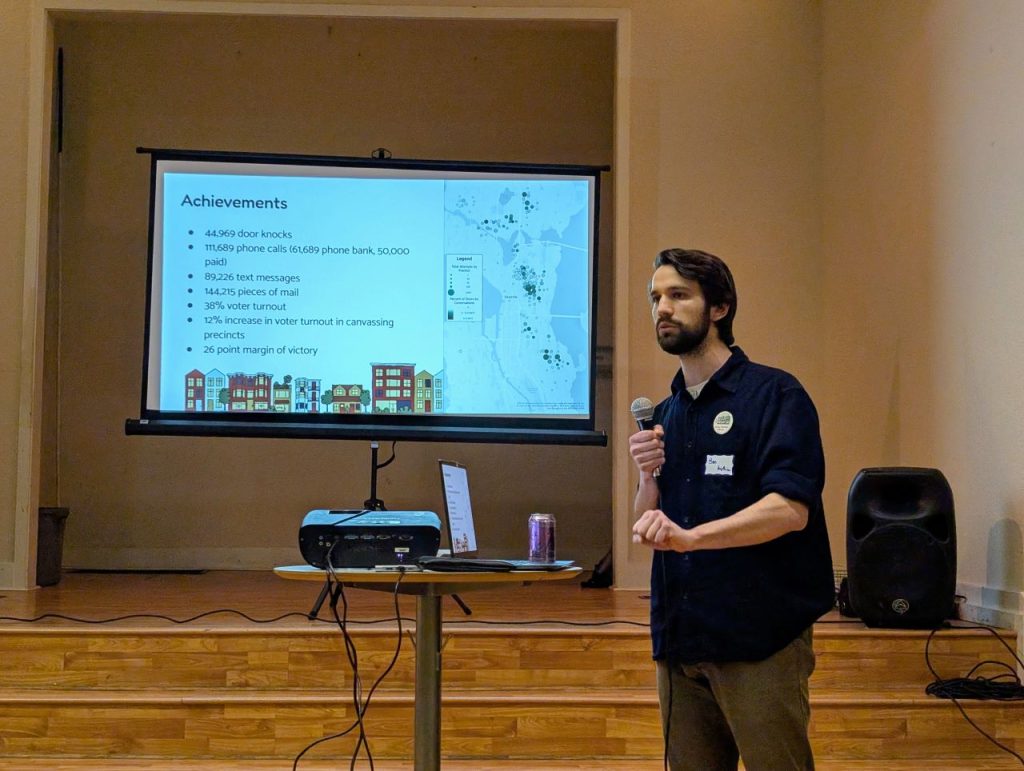
“We knocked 45,000 doors, made 120,000 phone calls, sent 90,000 text messages to voters, 144,000 pieces of mail, and folks we got out the word,” Ferlo told supporters. “February special elections over the last several decades have only seen anywhere between 29 to about maybe 35% of the turnout, and we smashed that record, literally setting a precedent with a 38% voter turnout in a special election.”
Washington Community Alliance researcher Andrew Hong analyzed campaign data and concluded that ground game had a big impact in the race.
“House Our Neighbor’s grassroots organizing undoubtedly contributed to Prop 1A’s success,” Hong told The Urbanist. “Rejecting conventional campaign wisdom, the campaign reached out to many people who had not voted in previous low-turnout special elections (a whopping 40% of voters the campaign canvassed and phonebanked had not voted in the last odd-year special election). But it paid off: the campaign doubled turnout among those disengaged voters who were contacted by the campaign. Overall, turnout was 12-13% higher among voters the campaign talked to, highlighting the efficacy of their ground game.”
While House Our Neighbors could not afford to send out as many campaign mailers as Prop 1B, the one they did send out was clean and effective in conveying their message. Francesca Oaksford garnered a shoutout at the rally Tuesday for doing the campaign’s illustration work. The campaign sent out 140,000 mailers to voters throughout Seattle.
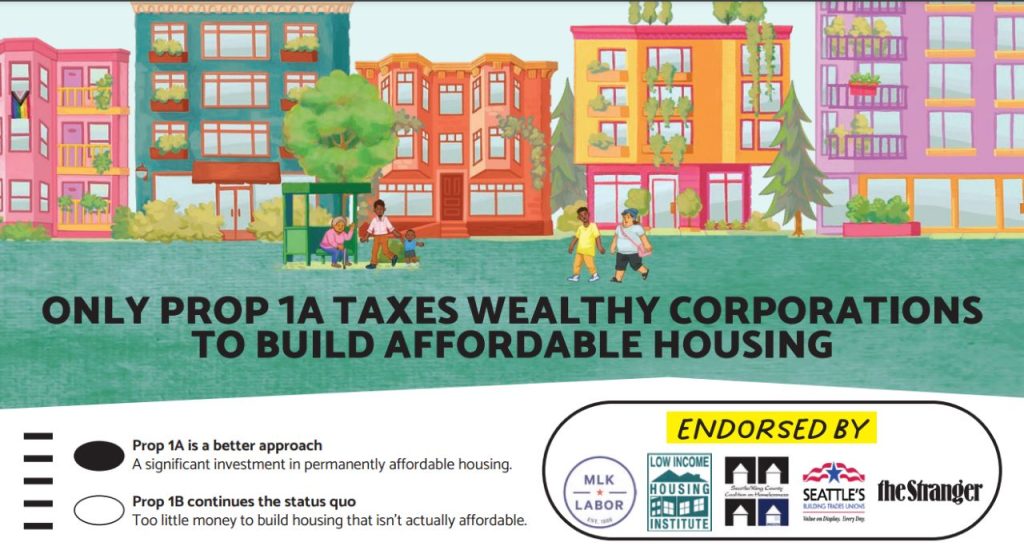
Although social housing advocates didn’t have backing from Mayor Harrell or most Seattle councilmembers, they did have a few high profile endorsements (including from The Urbanist). Among the endorsers was former state House Speaker Frank Chopp, a longtime champion for affordable housing who was in attendance Tuesday. Chopp expressed excitement to see buildings start getting constructed or rehabilitated.
“This victory is tremendous,” Chopp told The Urbanist. “The grassroots coalition that people have built has been absolutely inspiring.”
House Our Neighbors credited partnerships with Seattle Neighborhood Greenways, 350 Seattle, Seattle Democratic Socialists of America (DSA), Washington CAN, the MLK County Labor Council, and the building trades with propelling their ground game and amplifying their reach. Speakers also stressed that the effort was not a one-off, but part of a building a broader movement and educating voters about housing solutions.
“Our strategy was always education, persuasion, but also turnout,” McCoy said. “We had massive turnout for I-135 so it was tapping back into those people, tapping back into the people who signed I-135 and I-137 and those who have been like educating themselves on social housing through our trainings and our educational series. So yeah, always, always door knocking, because we are about building a movement, not just winning.”
The movement goes beyond Seattle in the eyes of supporters, and garnering volunteers (and not just in Seattle) is one area where they had a distinct advantage over Prop 1B. It’s hard to imagine corporate executives from other states dialing in to phonebank to stop a Seattle high earners business tax.
“National solidarity behind the social housing movement really should not be minimized,” McCoy said Tuesday. “We had folks calling in from Boston — Boston teachers union. We also had folks from DC, DC DSA called in. We had folks from Tacoma DSA, Tacoma Housing for All, and also folks from New York City.”
The momentum from Seattle’s win could pour over to those partner cities — or that’s the hope anyway.
“There are folks that we’ve been talking to over the past couple of years who want to replicate social housing in their jurisdictions,” McCoy said. “Just seeing that we’re building the campaign and spending time in their evenings from Boston, New York and all these other places calling for us. And that’s power.”
Corporate cash backfires
House Our Neighbors may not have had half a million dollars, but they did have the far stronger field operation. The Prop 1A campaign was also to turn aggressive business spending into a campaign issue late in the cycle, as money poured in. They hosted a rally at the Amazon Spheres to highlight big spending.
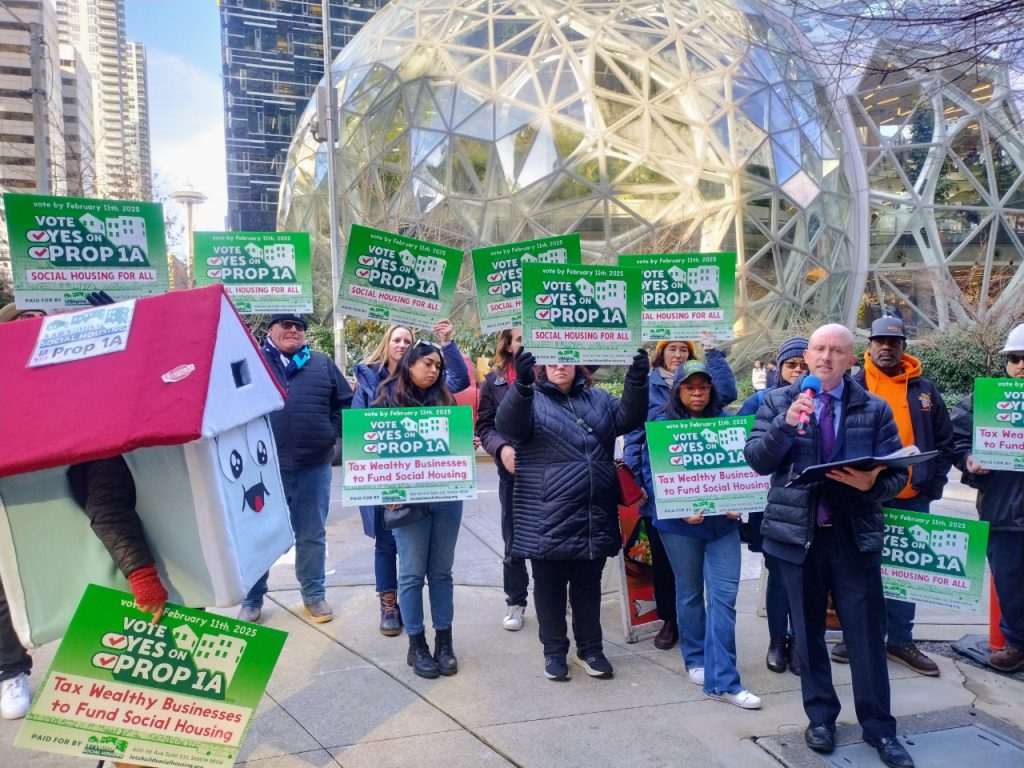
“Once Amazon and Microsoft dumped in those big money [contributions], we definitely took advantage of that and blasted that out there so that people knew that these companies don’t want social housing,” McCoy said.
Social housing advocates pointed out that the Seattle Chamber was neutral on the first question, which suggests that the Proposition 1B effort was intend to block Prop 1A more than it was to pass the alternative. If the first question on the ballot failed, then neither proposition would be enacted.
The first question won 73% of vote, showing the swell of support for social housing. The cynical strategy of staying neutral on the first ballot question didn’t pay off for Prop 1A opponents, and it may have undermined trust that Prop 1B was in fact a good faith effort to fund social housing.
For its part, the Seattle Chamber didn’t initially express any regrets about its decision to fight the social housing measure in a February 13 blogpost that’s since been deleted.
“Thank you to all members for supporting the Chamber’s work as we challenged Proposition 1A. Your guidance, thought partnership, and support of the campaign was important,” the chamber wrote. “It was also important that we pushed back on this proposal, which was not ready for primetime. We defeated local option capital gains taxes in Seattle last fall, we likely lost this one, but your Chamber will keep showing up as your champion – win or lose.”
Next steps for Seattle Social Housing Developer
The Harrell Administration has said it could take a year to set up the structures to administer the tax and conduct outreach to affected companies. House Our Neighbors is hoping to push the City to act more quickly.
“A 30-employee company that has workers that are paid over a million in Seattle, those wouldn’t be captured under JumpStart, so there are definitely new companies that will need to be reached out to educated and set up a system to contribute,” McCoy said. “But yeah, I don’t think that the city needs a whole year to do this, and I hope that they honor the same payment plan that they had with JumpStart, where the city was able to utilize that money, even though it wasn’t in pocket.”
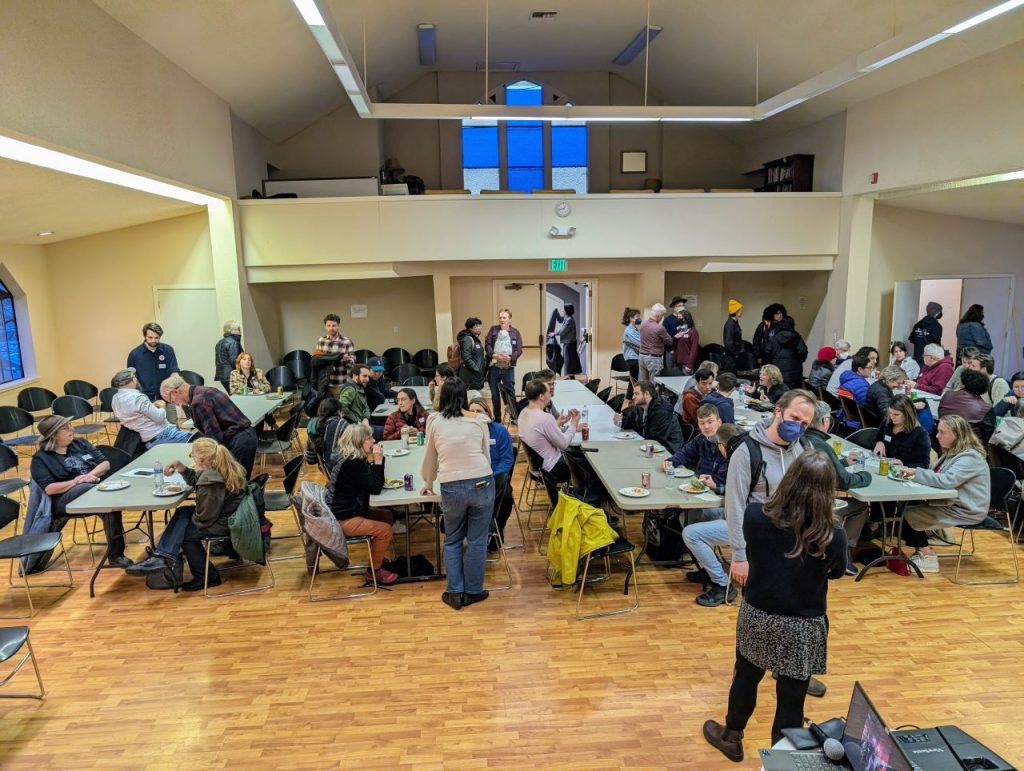
So far, the Seattle Social Housing Developer only has one employee, CEO Roberto Jiménez, who brings a wealth of experience developing farmworker housing in Sacramento. But Jiménez could soon have company, as the development authority staffs up. Already he’s eyeing properties that could become the developer’s first project — as soon as the spigot of Prop 1A revenue flows.
“The real issue, I think, is that there are real estate deals, projects available, and we’ve getting a lot of phone calls,” Jiménez told The Urbanist. “There are properties that are developed, that we could acquire and put them to social housing make them permanently affordable. And there are properties out there that we’ve been analyzing, that we’re very interested in, all just to get that tax revenue flowing in.”
House Our Neighbors sounded the alarm that the City of Seattle has been slow to disburse startup funds that had been required in the original Initiative 135 legislation setting up the PDA.
Harrell spokesperson Callie Craighead said the City would follow through on distributing funds as required by law, with another $445,000 in startup funds on the way. She also noted that Harrell “will be seeking to appoint another member with experience developing housing soon” to fill one of the vacancy on the PDA’s governing board.
“Now that the results of the election are certified, the City will follow the next steps as mandated by the Charter to support the objectives of the initiative,” Craighead said. “To date, the City has disbursed $405k in City funds and the PDA has spent approximately $350k of those funds. That leaves $445k to be disbursed from the start-up allocation of $850k. The Office of Finance received an invoice from the PDA requesting disbursement of the remaining funds yesterday and initiated that transfer.”
Harrell’s press team framed Harrell’s opposition as focused on the tax and its expected impact on Seattle’s economy rather than objecting to social housing.
“Mayor Harrell is on the record as a supporter of social housing as a novel way to combat the housing affordability crisis that impacts everyone in our city,” Craighead said. “However, at this fragile moment in Seattle’s economic recovery and while legislators are discussing a potential statewide payroll expense tax, he did not think it was prudent to increase taxes, which is why he supported 1B which would have used existing Payroll Expense Tax revenue to fund the developer. Businesses have choices and can move jobs to other cities in the region, impacting revenue sources that the City relies upon to deliver essential services.”
Now that they have a funding source, the social housing developer will be under even more scrutiny from skeptics.
The Seattle Chamber has pledged to hound the developer looking to expose slipups: “We will continue to bird dog the social housing public development authority just as we do other agencies to ensure they are accountable and delivering on what was promised the voters,” the chamber wrote in their February 13th post.
Some affordable housing professionals have also advised that the PDA adopt a comprehensive strategy to guide its investments, rather than a piecemeal approach. The Chamber of Commerce echoed a similar sentiment.
“We hope it can hire the necessary staff, beyond the single staff person it has today; develop needed financial, construction, and acquisition plans – instead of its ‘hypothetical business plan’; and deliver on campaign promises, which includes creating 2,000 units of housing in the next 10 years,” Chamber CEO Rachel Smith told Cascade PBS.
Jiménez noted its hard to lock in a plan until the developer has more certainty around revenue flow, which the election just provided. But in his interview with The Urbanist, it also became plenty clear that he’s already been grappling with the strategic decisions. He expressed interest in making a few acquisitions of existing building to renovate allowing them to deliver social housing sooner and begin establishing assets for future bonding. Jiménez also was establishing a sense of where early prototype new construction could look like and how to fit into the larger housing ecosystem.
“The medium size is say 40 to 60 units, and that’s kind of a sweet spot in some sense, because it’s a scale that is urban infill that doesn’t compete with affordable housing developers, because tax credits don’t really fund projects that small anymore,” Jimenez said. “They do at times, but it’s not preferable. And we’re not going to be using tax credits, but we also do not want to be in competition with the affordable housing developers who are utilizing tax credits. And then there’s the larger scale projects. And I don’t want to start off by building those, even though we’ve been building them for the last 10 years, but in some places we’d like to get to, we’d like them to be integrated into the communities that they’re in.”
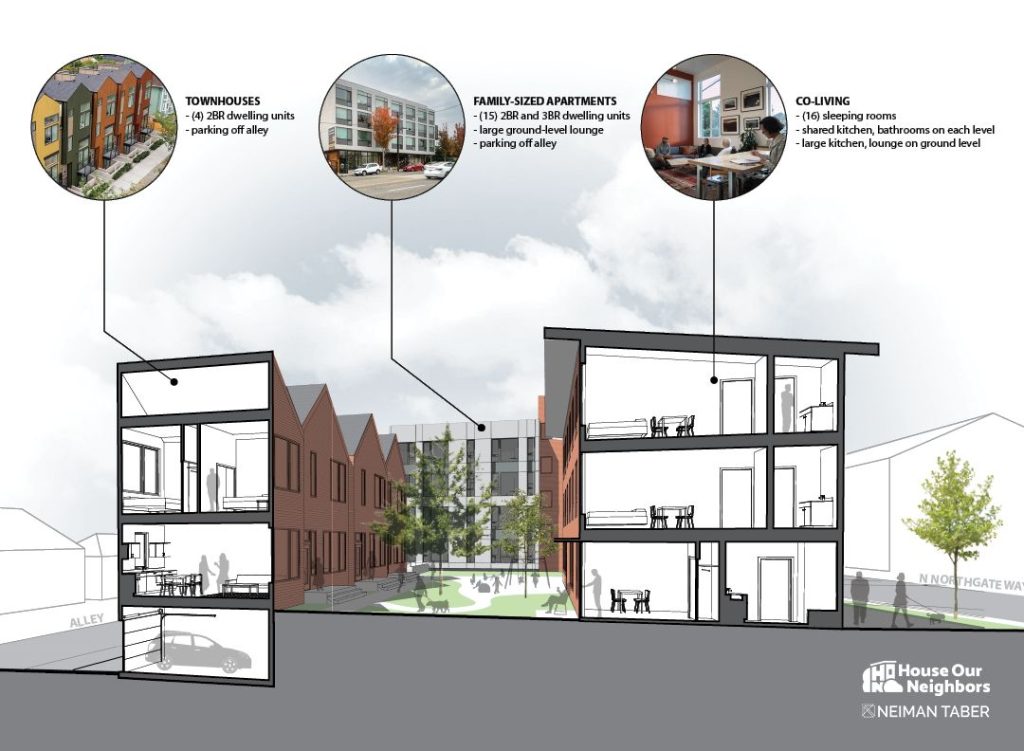
One unique part of being a social housing developer serving not just low-income residents, but also middle-income families is that the projects can be designed to operate profitably. In contrast, nonprofits are under pressure to require ongoing subsidy to maintain their federal tax credits, but not so unprofitably that their financial model would implode. It’s a delicate balance and one several housing nonprofits have warned is reaching crisis levels with pandemic-related turmoil and low occupancy rates in some buildings.
“Affordable tax properties are designed not to have cash flow,” Jiménez said. “You want to keep the cash flow low in order to obtain the credits, because if they throw off too much money, then you don’t have a tax liability. So it’s a constant balancing factor, the life property, it’s very challenging. Our properties are more like a market-rate property. They’re designed to throw up cash. That money goes into a revolving loan fund, pays off the loan and with interest, and so that loan fund keeps growing. And so we have money there to loan back to the properties when they have rehab needs.”
House Our Neighbors has said it will also continue to advocate for zoning changes that create more social housing opportunities around Seattle, continuing their One Seattle Comprehensive Plan advocacy. The group has backed Alternative 6, which goes beyond the mayor’s growth plan. (For example, Naishin Fu and I teamed up in an op-ed advocating for Alternative 6.) Ultimately, the city declined to study Alternative 6, which would have allowed social housing in every neighborhood and proposed incentives to explicitly encourage it. Instead, the City’s plan would keep apartments illegal in much of the city and make it hard for social housing to fit in former single family zones.
Next steps for the broader movement
Social housing’s second win has energized progressives in Seattle. Shemona Moreno, executive director of 350 Seattle, attended the rally and spoke to the inspiration it provided. The social housing developer has set the goal of building to deep green environment standards and fostering community with good design and the ability to root in place, goals 350 Seattle shares.
“We were talking literally to Tiffany today about the work she did in order to help put together a really good coalition. Because, we’re inspired by the power that this created as evidenced by the 26-point margin. Seattle’s ready for stuff like this. So I think we’re inspired by the hope that this brought I’m inspired by the different organizations that came together,” Moreno said.
The success has 350 Seattle thinking about more climate-related investment.
“What does a huge infusion of climate-resilient investment look like in our city, of not just housing, but transportation?” Moreno mused. “We’re looking at, what it would look like to scale outside of Seattle, to move to a countywide and even thinking through what it would look like to that pie-in-the-sky dream of doing statewide.”
Statewide conservative ballot initiative campaigns to repeal progressive taxes and climate investment programs have been rejected, which has progressives pointing to the potential for more. The need is great at multiple levels of government grapple with budget shortfalls as the Trump Administration wreaks havoc on longstanding programs and threatens a trade war with which Washington State will be especially vulnerable.
“Together with the defeat of I-2109, I-2117, and I-2124 in 2024, the approval of Prop 1A in this special election affirms broad support for progressive taxation among Washington’s electorate.” Washington Community Alliance’s Tim O’Neal told The Urbanist.
On the flipside, the Seattle Chamber of Commerce has hinted at a new strategy as well to deal with the onslaught of grassroots initiatives they’ve struggled to contain.
“These ballot initiatives are becoming prolific,” the Chamber wrote in its February 13 update. “In addition to Prop 1A, over the last couple of elections we have seen minimum wage increases in Burien, Tukwila, Renton and Everett all by initiative. Tacoma passed a tenant protection initiative. And the conversation around solving the housing crisis is not working. It’s time for a total regroup and a reassessment of our organizational partnerships on this topic.”
Correction: An earlier version misstated the amount spent by opponents due to a transcribing error.
Doug Trumm is publisher of The Urbanist. An Urbanist writer since 2015, he dreams of pedestrian streets, bus lanes, and a mass-timber building spree to end our housing crisis. He graduated from the Evans School of Public Policy and Governance at the University of Washington in 2019. He lives in Seattle's Fremont neighborhood and loves to explore the city by foot and by bike.


